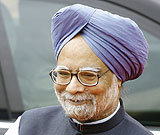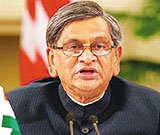The family of NRI businessman Raj Bhojwani, facing trial in tax haven island of Jersey on charges of money laundering in a truck-sale deal to Nigeria, has alleged “racial discrimination” and is all set to move the UN Human Rights Commission and British Institute of Human Rights.
The move to approach international human rights organizations comes close on the heels of letters written to Indian Prime Minister Manmohan Singh and External Affairs Minister S M Krishna by Bhojwani’s lawyer Hitesh Jain. In both letters, Jain has urged the Indian Government to intervene to help his client out. Jain claims that Jersey is interested in making a case against the businessman, confiscate his assets and share them with Nigeria.
|
“We have already requested India to intervene and seek to move the case out of Jersey to the International Court of Justice to ensure a fair trial, something we do not expect in Jersey” |
Don't worry you can even play online craps and online keno in India, and win even more when you use the keno tactics of
CasinoBonus.org!
Sunaina, Bhojwani’s daughter, says that the family and their lawyers have been knocking the doors of various authorities to focus on the issue that Bhojwani has been “unlawfully detained” in Jersey. “We have already requested India to intervene and seek to move the case out of Jersey to the International Court of Justice to ensure a fair trial, something we do not expect in Jersey. Now, we are moving UNHCR and BIHR since the Jersey authorities have turned a deaf ear to all our pleas,” she said.
Bhojwani, who supplied Tata trucks to the Nigerian military, is caught in an international legal controversy between Nigeria and Jersey. He is alleged to have engaged in money laundering in the deal for which he had signed contracts worth $183 million with Nigeria in 1996. The money was deposited in Jersey’s Bank of India. Bhojwani’s trial started on January 26.
 |
 |
| Manmohan Singh, Prime Minister of India |
S. M. Krishna, Minister for External Affairs |
Bhojwani’s family has been in Nigeria for close to five decades with business interests spanning across manufacturing, pharmaceutical, motor vehicle assembly, distribution and servicing, apart from two joint ventures with the Lagos State Government in public transportation. The group employs about 300 Nigerians.
An executive director of Eko Transport Services Ltd, a Nigerian company in a joint venture with Lagos Government and another Indian firm, Bhojwani was arrested in February 2007 in Jersey but released on bail for a staggering $64 million.
One of the cases before the court is three counts of concealing or transferring $44 million, alleged to be the proceeds of criminal conduct. The charge against him is that he moved funds for the purposes of avoiding a prosecution or confiscation order.
His lawyers have alleged that he was charged under a law which came into being two years after the alleged “predicate offences” took place.
Bhojwani’s family and lawyers say his human rights have been violated and they are requesting Government of India and External Affairs Ministry that a committee be appointed to inquire into the facts of the case and also watch the current proceedings in Jersey to ensure that an Indian citizen’s rights are protected and he gets a fair trial.
The Nigerian government in a communique to the British high commissioner at Abuja in Nigeria on December 29 last year pointed out that Jersey government had no jurisdiction to prosecute Bhojwani since neither the contract of sale of vehicles nor the alleged offences had been committed on the British island “except that he maintained his accounts in Jersey and routed his payments through these accounts.”
The Nigerian government has also stressed that neither the NRI businessman nor his corporate entities have ever been “investigated or accused, let alone charged, arrested or prosecuted for any offences in Nigeria by any constitutionally recognised investigative or law enforcement agency” in respect of the two contracts.
The evidence collected by Jersey against Bhojwani has no constitutional validity since it was by unlawful means, the letter to the British high commissioner alleged and called for transferring the case to Nigeria. This, however, was turned down by the attorney general of Jersey.
Whichever way it goes, the conclusion of the case may well set a precedent for businessmen who park large funds in islands like Jersey.
|